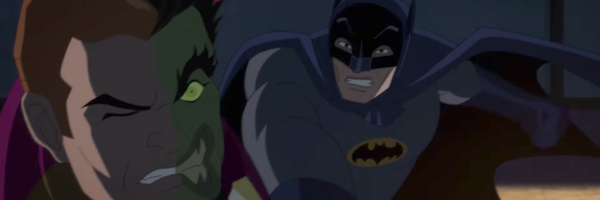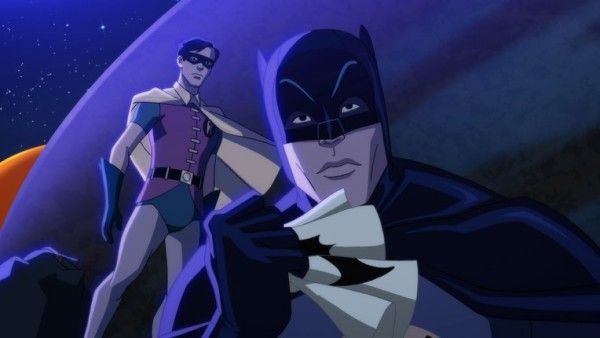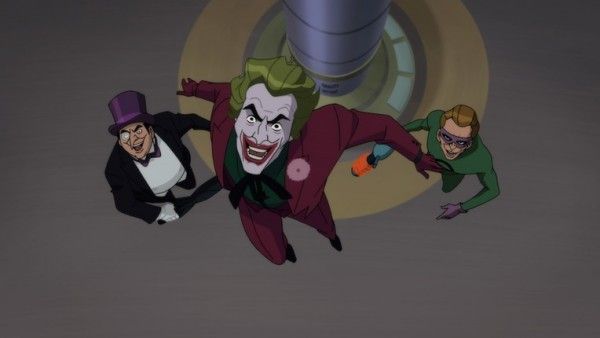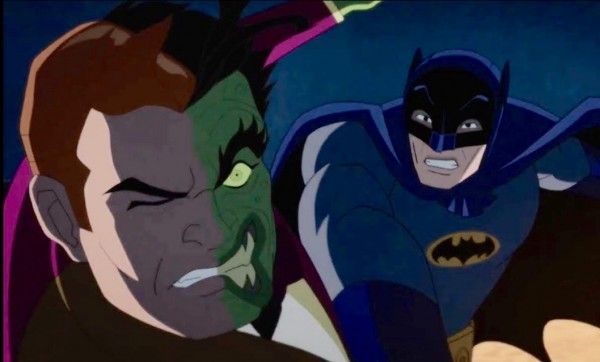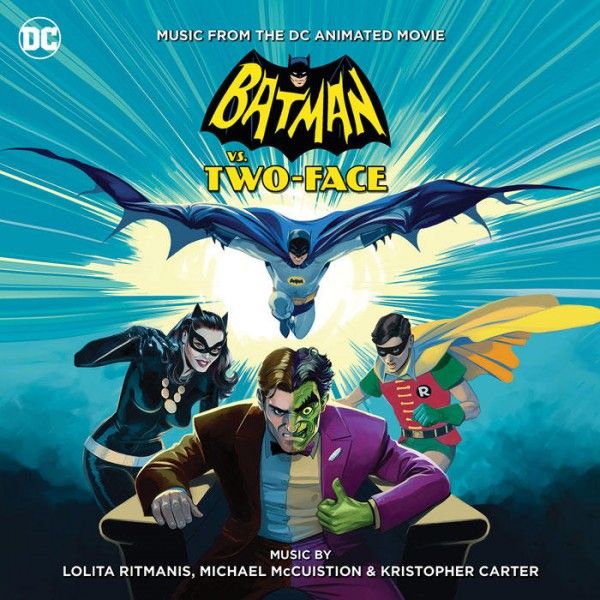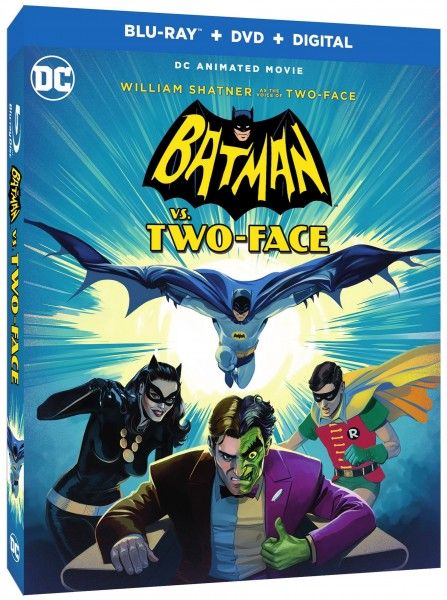DMP, the collective formed by musicians Michael McCuistion, Lolita Ritmanis, and Kristopher Carter, has been providing the music to Batman's on-screen adventures since the early 90s. Starting with Batman: The Animated Series and continuing over the years right up to their Annie Award-nominated composition for Warner Bros. Home Entertainment's Batman: Return of the Caped Crusaders, DMP is continuing to bring music to the animated DC Comics universe. Next up, the follow-up to that 60s-inspired Batman and Robin adventure, Batman vs. Two-Face. The new animated feature film will make its world premiere at the upcoming New York Comic-Con on October 8th before heading to home video on October 10th.
I had a chance to chat with DMP about their history scoring Batman's adventures, what inspired them for this very specific take on the character, what's changed musically since Batman: Return of the Caped Crusaders, and what it was like coming up with music for newly appearing villains. Plus, we got into the modern music biz and how it's changed and shaped Batman's sound over the years. And fans of Young Justice will be happy to know that the familiar sounds of DC Comics' animated music will have a presence in Season 3, since DMP is also handling the show's composition. All that and more follows below.
If they had to define the music of Batman as a character and a franchise in three words:
Michael McCuistion: Wow — how about “introspective, punishing, fearless?!”
Thinking back to Batman: Return of the Caped Crusaders, which earned the trio an Annie Award nomination, here are the sources of inspiration, musically speaking:
Lolita Ritmanis: There have been so many great composers and arrangers who provided inspiration for both Batman: Return of the Caped Crusaders and Batman vs Two-Face: Neal Hefti, Nelson Riddle and Billy May, among others. The style of music is really quite complex. We had to sharpen our jazz chops a bit and get in the groove to pay homage to the greats of that era!
The Annie nomination was an absolute thrill. To be nominated alongside Hans Zimmer and Alexandre Desplat, to name but two of the other composers nominated in our category, was an honor.
Like the 60s series itself, the music in Batman: Return of the Caped Crusaders has a good balance of whimsy and action. How do you make your score so dynamic?
Kristopher Carter: We talked a lot with our producer, James Tucker, about what sort of tone needed to be featured, where and how it might shift and when it would be most effective to lean towards (or away from) the action playing out onscreen. Having mapped out a ‘course’ for the tone we needed to set made it much easier to make those crucial composing decisions that would complement the storytelling.
Did any themes carry over from Batman: Return of the Caped Crusaders to the new movie, Batman vs Two-Face?
Carter: Most of them! We created themes for Joker, Penguin, Riddler and Catwoman and in keeping with the style of the 1960s, we feature them prominently when that character has the spotlight onscreen. Also, the scene where Batman and Robin slide down the poles to the Batcave makes use of a new arrangement of the piece that accompanied the corresponding scene in the first film.
Was the process easier this time around having already completed the music for the first movie?
Ritmanis: Since we had already set a tone, I wouldn’t necessarily say it was easier, but we had a starting place. The films had different needs and they presented different opportunities for musical expression.
Since new villains come onto the scene in this film, what was the process like coming up with their themes?
McCuistion: Writing a theme always affords us a great opportunity to collaborate—in this case, with our producer James Tucker. We talked about the characters in detail—what makes them who they are, what motivates them—and then we talked about the way the themes needed to express the story of the film. Knowing, for instance, that the Two-Face theme needed to have an innocent quality for Harvey and a menacing quality for Two-Face greatly informed the creative process and provided valuable context when we were deciding what the music needed to ‘say’ in various scenes throughout the picture. Then it was up to us to ‘summon our muse’ and craft a musical motif or sound that could be recognizably associated with each character. This can be a tall order but it’s one of the most fun and intuitive aspects of the film scoring process!
How has the music of animated versions of Batman evolved over the years and throughout your career?
Ritmanis: As composers, we take our lead from the visionary behind each show or film. The style and mood of the story are determined long before the music comes into play. The musical language that was developed for the animated Batman series began with Shirley Walker and her collaboration with Bruce Timm. Shirley set the bar incredibly high with her attention to detail in all aspects of the music and the production of the music. We learned so much from her. When we segued into Batman Beyond, we all donned completely different musical hats, so to speak! Kris’ theme is to this day one of the most iconic, recognizable themes for a superhero show. Justice League and Justice League Unlimited gave us the scope to weave more epic musical statements into the DC Animated Universe, with each of our themes receiving Primetime Emmy Nominations (Justice League Unlimited for Michael and Justice League for yours truly)! Batman: The Brave and the Bold allowed us to have a bit more fun. It’s been quite a ride; one we hope will continue for many years to come.
How has the instrumentation and available technology changed your approach to composition?
McCuistion: Computers, samplers and synthesizers have transformed the composition process— the workflow has morphed into something entirely different from what it was! Before sequencers and samplers, pretty much every phase of the process of writing music to picture was done on paper. The focus was mainly on composing the music, with very little input from technology until the scoring session—when everything would be recorded (usually by live musicians) and mixed. The scoring stage was, by and large, the ‘home’ of most of the technology at that point, in the form of recording equipment (microphones, mixing boards, tape machines, cables, amplifiers etc.). Once home computers became capable of sequencing and samples became expressive enough to create mock-ups of live performances, our focus began to shift.
Now we are especially concerned with how things sound when they’re played by our sequencers and how we can put together a satisfying presentation that will bear fruit during the collaborative process. This has led to a shift in focus from ‘only’ writing music to also upgrading and maintaining our own home studios—and in terms of the writing process, spending time programming and tweaking our sequencing software to ensure that we produce the best performances for the music we have written. As a result of these changes, we collaborate very closely with our filmmakers ahead of a live recording session; we devote more time to the music writing process (including collaboration with our in-house production staff) and we simultaneously produce recordings of our written material.
If the music of Superman and the music of Batman had an epic battle, which one would win?
Carter: It certainly would be epic, wouldn't it? A musical battle of the ages! I think they would be pretty evenly matched, at least until Wonder Woman’s theme comes soaring into the fray… I’d have to say that she would cast the deciding final cadence!
Final question: What other upcoming projects do you have lined up?
Ritmanis: In the DC Universe, we are thrilled to be working on season three of Young Justice. We cannot reveal anything else at this time but stay tuned!
Keep an eye out for Batman vs Two-Face arriving on video October 10th, but you can listen to DMP's excellent musical work on two albums available now: Batman and Harley Quinn: Music From The DC Universe Original Movie and Batman Vs. Two-Face: Music From The DC Animated Movie.

